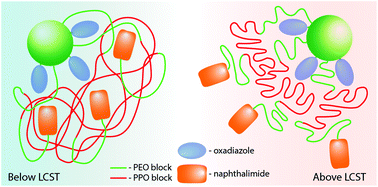Temperature responsive nanoparticles: poloxamers as a modulator of Förster resonance energy transfer (FRET)
Abstract
An effective strategy to control the Förster resonance energy transfer (FRET) of a donor/acceptor emitter pair that were attached to a 60 nm poly(propargyl acrylate)(PA) nanoparticle using temperature variations was developed. The size dependent properties of a poly-(ethylene oxide)-poly-(propylene oxide)-poly-(ethylene oxide) (PEO-PPO-PEO) block copolymer (poloxamer) was exploited to vary the spatial separation of the emitters and vary the FRET efficiency. Specifically, a 2% change in FRET efficiency between the donor/acceptor pair was achieved per 1 °C change in temperature from 49 °C to 60 °C when using a poloxamer of 2950 g mol−1 molecular weight, with sections of PPO consisting of 32 repeat units, PEO sections consisting of 12 repeat units and a lower critical solution temperature (LCST) of 58 °C. The methodology presented in this effort is easily extended to other temperature regimes through a judicious choice in poloxamer and corresponding LCST.



 Please wait while we load your content...
Please wait while we load your content...
